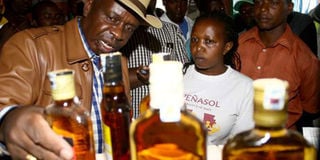Counterfeit liquor cartels penetrate high-end market

The National Authority for the Campaign against Alcohol and Drug Abuse chairman John Mututho inspects some alcoholic drinks in a bar in Nakuru on February 14, 2016. Kiharu MP Irungu Kang’ata recently petitioned the National Assembly Committee to look into the use of fake KRA stamps in the alcohol market. PHOTO | SULEIMAN MBATIAH | NATION MEDIA GROUP
What you need to know:
- While in the past they were thought to concentrate on low-end brands, there are indications that more expensive alcoholic drinks are also targeted.
- In July, a consignment of fake KRA stamps was found inside a house in Nairobi’s Komarock estate.
A cartel that has penetrated the alcohol industry with counterfeit liquor supplied in branded bottles has taken its activities a notch higher by printing thousands of fake Kenya Revenue Authority stamps.
While in the past they were thought to concentrate on low-end brands, there are indications that more expensive alcoholic drinks are also targeted.
The fake KRA stamps, which are required to be attached to the bottles, are said to be in large circulation with the merchants of the illegal drinks known to sell at lower prices — minting millions of shillings, avoiding tax and risking thousands of lives with their dubious content.
Kiharu MP Irungu Kang’ata, who recently petitioned the National Assembly Committee to look into the use of fake KRA stamps in the alcohol market, said failure to involve legitimate brewers and corruption is largely to blame for the success of the cartel.
“The phenomenon of illicit alcohol is no longer the ones sold in the villages and dirty places, they are available in the market using counterfeited brands and corruption by the enforcement officers is proving costly.
"We need to give some powers to associations in this industry like we did to the Music Copyright Society of Kenya. I believe the same rationale should be adopted in fighting fake alcohol to save the country from heavy revenue losses and health risks,” Mr Kang’ata said.
The legislator is also pushing for the increment of penalties for the offenders to a minimum of Sh50 million without a maximum.
The proposals, including decentralisation of KRA’s market surveillance, involves the police verifying fakes and reforms meant to weed out corrupt officers at the tax agency.
These are included in the petition currently before the Finance Committee of the National Assembly.
The Committee is expected to begin summoning heads of agencies including the Kenya Bureau of Standards, the Anti-Counterfeit Agency and KRA from next week.
The illicit alcohol cartel is powerful and well connected.
In July, a consignment of fake KRA stamps was found inside a house in Nairobi’s Komarock estate.
The stamps were meant to be used on fake spirits with several brands of bottle caps found.
KRA Commissioner of Domestic Tax Benson Korongo said he was aware of the cartel.
“KRA has received information on this particular incident and the case is currently under investigation. The Authority continues to ensure prompt prosecution of offenders and seizure of illicit products,” Mr Korongo said in response to our enquiry about 391 boxes of stamps reportedly confiscated and kept at Nairobi’s Kayole Police Station.
TAX COMPLIANCE
The 391 boxes would contain 46.8 million stamps whose sale values alone amounts to Sh70 million and when used on 1 litre bottles would earn KRA Sh8.1 billion shillings in excise tax revenue.
And a morning raid conducted on September 7 in the suspects’ house revealed more fake stamps and liquor as it emerged that his previous consignment had been mysteriously moved from Kayole to Buruburu police station.
The couple, who were arrested in July, had been reportedly released under unclear circumstances.
The police did not immediately respond to our questions on the allegations.
KRA has since introduced new generation excise stamps with Quick Response Code that can be authenticated using a smartphone.
The old generation paper stamps affixed on wines, cigarettes and beer will, however, continue to be in use until the products in the market are exhausted.
The Electronic Goods Management System rolled out in 2013 is said to have turned round tax compliance in some selected companies with a huge climb in tax collection.
“Three selected companies (one tobacco and two spirits) recorded growth of excise duty which rose by 183 per cent from Sh1.43 billion in 2012 to Sh4.1 billion in 2015/16.
In the period, excise duty paid by the spirits companies rose by 743 per cent from Sh0.34 billion to Sh2.9 billion in 2015/16.
Similarly excise duty paid by the tobacco company recovered from an all-time low of Sh0.59 billion in 2013/14 to Sh1.16 billion in 2015/16,” Mr Korongo told the Sunday Nation.
These revenues are, however, under a huge threat from the use of the fake stamps with the 21 genuine manufacturers estimated to be capable of generating up to Sh2 billion monthly in tax revenues when the fakes are eliminated.





